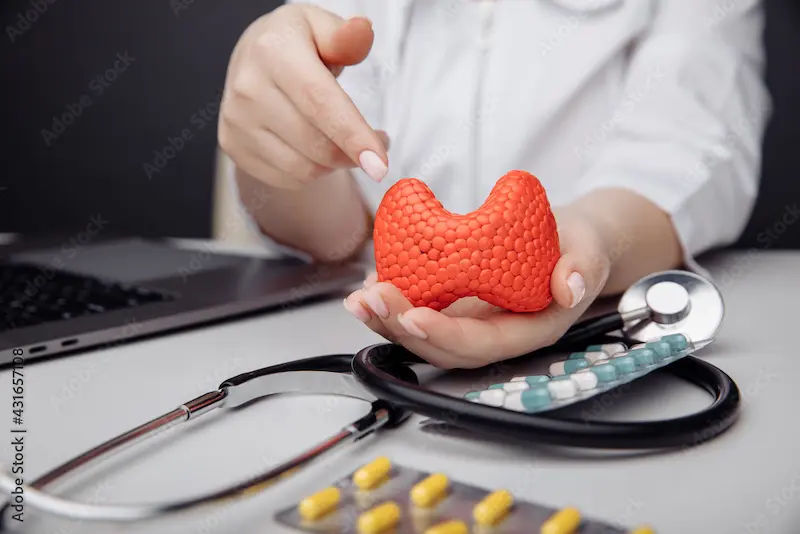Guide to What Do You Need Know About Hypothyroidism
A comprehensive guide to hypothyroidism, including its causes, symptoms, diagnosis, and treatment options. Learn what you need to know about this common thyroid condition.


Introduction
Feeling constantly drained, struggling with unexplained weight gain, or battling brain fog? These common complaints could point to a small butterfly-shaped gland in your neck: your thyroid. Hypothyroidism, or an underactive thyroid, is a condition where this gland doesn't produce enough crucial hormones to keep your body running smoothly. It affects millions, often with subtle symptoms that are easily mistaken for everyday stress or aging. This comprehensive guide will walk you through everything you need to know about hypothyroidism—from recognizing the early signs and getting an accurate diagnosis to understanding treatment options and lifestyle changes that can help you reclaim your energy and well-being. Let's demystify this common condition together.
What is Hypothyroidism?
Hypothyroidism is a medical condition characterized by an underactive thyroid gland. This essential gland, located at the base of your neck, is responsible for producing two primary hormones: thyroxine (T4) and triiodothyronine (T3). These hormones travel through your bloodstream, regulating your metabolism—the process by which your body converts food into energy. They influence the function of virtually every organ, including your heart, brain, muscles, and skin. When thyroid hormone production drops, your body's processes slow down, leading to a wide range of symptoms.
The Role of Your Thyroid Gland
Think of your thyroid as your body's thermostat or metabolic engine. It sets the pace for your energy use. It operates on a feedback loop with your pituitary gland in the brain. When thyroid hormone levels are low, the pituitary releases Thyroid-Stimulating Hormone (TSH), which signals the thyroid to produce more T4 and T3. In hypothyroidism, the thyroid gland doesn't respond adequately to this signal, leading to low levels of thyroid hormones and elevated levels of TSH.
How Hypothyroidism Disrupts Your Body
The slowdown caused by an underactive thyroid has a cascading effect. Your heart rate may slow down, your intestinal tract becomes sluggish (leading to constipation), and your body burns fewer calories at rest, which can lead to weight gain. Even your mental processes can become delayed, contributing to feelings of brain fog and depression. It's a whole-body condition that requires a whole-body approach to management.
Consult Top Specialists
Common Causes of an Underactive Thyroid
Understanding the root cause of your hypothyroidism is key to effective management. The causes range from autoimmune attacks to medical treatments.
Hashimoto's Thyroiditis: The Leading Cause
In the developed world, the most common cause of hypothyroidism is Hashimoto's thyroiditis, an autoimmune disorder. In this condition, your body's immune system mistakenly identifies your thyroid gland as a foreign invader and produces antibodies to attack it. This chronic inflammation eventually damages the thyroid, impairing its ability to produce hormones. Hashimoto's often runs in families and is more prevalent in women.
Other Potential Causes
- Medical Treatments: Thyroid surgery (thyroidectomy) for cancer or nodules, and radioactive iodine therapy used to treat hyperthyroidism (an overactive thyroid), often result in permanent hypothyroidism.
- Radiation Therapy: Treatment for cancers of the head and neck can affect the thyroid gland.
- Medications: Certain drugs, such as lithium (for bipolar disorder) and some heart medications, can interfere with thyroid function.
- Congenital Hypothyroidism: Some babies are born with a defective or absent thyroid gland.
- Iodine Deficiency: Iodine is essential for thyroid hormone production. While rare in countries with iodized salt, it remains a common cause worldwide.
- Pituitary Disorder: A problem with the pituitary gland can mean it doesn't produce enough TSH to stimulate the thyroid.
Recognizing the Signs: Symptoms of Hypothyroidism
The symptoms of hypothyroidism are often insidious and develop slowly over years, making them easy to attribute to other factors. They are also highly variable from person to person.
Physical Symptoms You Might Experience
The most well-known physical symptoms of hypothyroidism include:
- Fatigue and lethargy: Feeling exhausted despite sleeping enough.
- Weight gain: Unexplained weight gain or difficulty losing weight.
- Sensitivity to cold: Feeling cold when others are comfortable.
- Dry skin and brittle hair and nails.
- Constipation.
- Hoarseness of voice.
- Muscle weakness, aches, tenderness, and stiffness.
- Heavy or irregular menstrual periods.
The Overlooked Mental and Emotional Symptoms
Beyond the physical, the mental slowdown is profound and often the most distressing aspect. Many people report:
- Brain fog: Difficulty concentrating, memory lapses, and a feeling of mental sluggishness.
- Depression and low mood: A direct result of the hormonal imbalance.
- Slowed thinking and speech.
If you're experiencing a cluster of these symptoms, especially hypothyroidism and depression or persistent brain fog, it's worth discussing with a doctor.
Getting a Diagnosis: Tests for Hypothyroidism
If you suspect you have hypothyroidism, a simple blood test is the first step to confirmation. It's crucial to get an
accurate diagnosis for hypothyroidism to begin proper treatment.
The TSH Test and What Your Numbers Mean
The primary test is the Thyroid-Stimulating Hormone (TSH) test. Because the pituitary gland pumps out more TSH in a desperate attempt to wake up a sluggish thyroid, a high TSH level is the most sensitive indicator of hypothyroidism. Normal TSH levels typically fall between 0.4 and 4.0 milli-international units per liter (mIU/L), but this range canvary slightly by lab and age. A TSH level above this range suggests an underactive thyroid.
Additional Thyroid Function Tests (T4, T3, Antibodies)
- T4 (Thyroxine) Test: This measures the actual level of the main thyroid hormone circulating in your blood. A low level of T4, along with a high TSH, confirms the diagnosis.
- T3 (Triiodothyronine) Test: T3 is the more active hormone. Levels are usually normal in early hypothyroidism and may not be routinely measured.
- Thyroid Antibody Test: This test checks for the presence of antibodies attacking the thyroid (specifically anti-
thyroperoxidase antibodies), which confirms Hashimoto's disease as the cause.
If your condition is complex or you're not responding to treatment as expected, consulting an endocrinologist via a
platform like Apollo24|7 can provide specialized insight.
Standard Hypothyroidism Treatment Options
The good news is that hypothyroidism is almost always manageable with modern medicine. The goal of treatment is to replace the hormone your thyroid can no longer make, restoring your hormone levels to normal and alleviating your symptoms.
Levothyroxine: The Gold Standard Medication
The standard treatment for hypothyroidism is daily oral medication with a synthetic form of thyroxine (T4) called
levothyroxine (brand names include Synthroid, Levoxyl, Tirosint). This medication is identical to the hormone your
body naturally produces. It is effective, safe, and has minimal side effects when taken at the correct dose. It's not a "one-size-fits-all" medication; finding the right dosage is a precise process that requires patience and ongoing monitoring.
How to Take Your Medication Correctly
- For levothyroxine to work effectively, consistency is key.
- Take it on an empty stomach: Ideally, 30-60 minutes before breakfast or any other medication or supplement.
- Be consistent: Take it at the same time every day.
- Don't skip doses.
Foods and Supplements That Interfere with Absorption
Certain substances can significantly impair your body's ability to absorb levothyroxine. It's best to take your pill several hours apart from:
- Calcium supplements and iron supplements.
- High-fiber foods (like bran).
- Soy products (in large amounts).
- Walnuts and grapefruit juice.
If your condition does not improve after starting medication or you experience persistent symptoms, it's important to book a follow-up with your doctor on Apollo24|7 to check your levels and adjust your dosage.
Lifestyle and Diet for Thyroid Health
While medication is essential, lifestyle factors play a crucial supporting role in managing hypothyroidism and improving your overall quality of life.
The Truth About "Thyroid-Friendly" Diets
There is no magic "thyroid diet," but a balanced, nutrient-rich diet is vital. The internet is full of misinformation,
particularly about goitrogens (substances in cruciferous vegetables like broccoli and cauliflower that can interfere with thyroid function). The truth is, you would have to eat an enormous amount of raw goitrogens for them to be a concern—cooking significantly reduces their effect. Focus on:
- Whole foods: Fruits, vegetables, lean proteins, and whole grains.
- Adequate selenium and zinc: Found in Brazil nuts, seafood, and legumes, these minerals are important for converting T4 to the active T3 hormone.
- Managing iodine intake: Most people get enough from iodized salt. Both deficiency and excess can be problematic, so avoid high-dose iodine supplements unless prescribed.
The Importance of Exercise and Stress Management
- Exercise: It can be incredibly challenging to start exercising when you're fatigued, but even gentle, regular activity can help combat symptoms like fatigue, weight gain, low mood, and sluggish digestion. Start slowly with walking, yoga, or swimming.
- Stress Management: Chronic stress can exacerbate thyroid problems and disrupt hormonal balance. Practices like meditation, mindfulness, and ensuring adequate sleep are non-negotiable components of a holistic management plan.
Living Well with Hypothyroidism
Being diagnosed with a chronic condition can be daunting, but hypothyroidism is one you can learn to manage
effectively and live a full, healthy life with.
Monitoring Your Condition Long-Term
Hypothyroidism is typically a lifelong condition, but that doesn't mean it has to control your life. Long-term
management involves:
Taking your medication consistently.
Getting annual blood tests (or as recommended by your doctor) to ensure your TSH levels remain in the target range. Apollo24|7 offers convenient home collection for TSH and other thyroid function tests, making monitoring easier.
Staying in communication with your doctor about any new or returning symptoms.
When to Talk to Your Doctor About Adjusting Medication
Your needs can change over time due to factors like weight change, pregnancy, menopause, or other medications.
Contact your doctor if:
- Your symptoms return despite being on medication.
- You develop symptoms of over treatment (anxiety, insomnia, palpitations, sweating), which could indicate your dose is too high.
- Your lifestyle or diet changes significantly.
Open communication with your healthcare provider is the cornerstone of effective management.
Consult Top Specialists
Quick Takeaways
- Hypothyroidism is a common condition where the thyroid gland doesn't produce enough hormone, slowing down the body's metabolism.
- Symptoms are wide-ranging and include fatigue, weight gain, cold intolerance, depression, and brain fog.
- Hashimoto's autoimmune disease is the most common cause.
- Diagnosis is simple, via a blood test to check TSH and T4 levels.
- Treatment involves daily synthetic thyroid hormone (levothyroxine) medication, which is highly effective.
- Taking medication correctly—on an empty stomach and away from interfering supplements—is crucial for success.
- A balanced diet, regular exercise, and stress management are key supportive lifestyle measures.
Conclusion
Navigating a hypothyroidism diagnosis can feel overwhelming, but it's important to remember that this is a highly
manageable condition. By understanding the role of your thyroid, recognizing the symptoms, and committing to a
treatment plan that includes consistent medication and healthy lifestyle choices, you can effectively control your
symptoms and regain your energy and vitality. The journey requires patience—finding the right medication dosage takes time, and lifestyle changes are a marathon, not a sprint. Listen to your body, keep the lines of communication open with your healthcare provider, and advocate for your own health. If you suspect you have thyroid issues, don't hesitate to take the first step. Consult a doctor online with Apollo24|7 to discuss your symptoms and get the necessary blood tests to begin your journey back to wellness.
Consult Top Specialists

Dr. Rajib Ghose
General Physician/ Internal Medicine Specialist
25 Years • MBBS
East Midnapore
VIVEKANANDA SEBA SADAN, East Midnapore

Dr Aakash Andgi
General Physician/ Internal Medicine Specialist
9 Years • MBBS MD
Bengaluru
Apollo Clinic, JP nagar, Bengaluru

Dr. Rohit Basu
General Practitioner
8 Years • MBBS, DNB (General surgery)
East Midnapore
VIVEKANANDA SEBA SADAN, East Midnapore

Dr. Santanu Mandal
General Physician/ Internal Medicine Specialist
17 Years • MD (Physician), DNB (General Medicine)
Kolkata
MCR SUPER SPECIALITY POLY CLINIC & PATHOLOGY, Kolkata
(25+ Patients)

Dr. Soumen Paul
General Physician/ Internal Medicine Specialist
24 Years • MBBS
Kolkata
MCR SUPER SPECIALITY POLY CLINIC & PATHOLOGY, Kolkata
(50+ Patients)
Consult Top Specialists

Dr. Rajib Ghose
General Physician/ Internal Medicine Specialist
25 Years • MBBS
East Midnapore
VIVEKANANDA SEBA SADAN, East Midnapore

Dr Aakash Andgi
General Physician/ Internal Medicine Specialist
9 Years • MBBS MD
Bengaluru
Apollo Clinic, JP nagar, Bengaluru

Dr. Rohit Basu
General Practitioner
8 Years • MBBS, DNB (General surgery)
East Midnapore
VIVEKANANDA SEBA SADAN, East Midnapore

Dr. Santanu Mandal
General Physician/ Internal Medicine Specialist
17 Years • MD (Physician), DNB (General Medicine)
Kolkata
MCR SUPER SPECIALITY POLY CLINIC & PATHOLOGY, Kolkata
(25+ Patients)

Dr. Soumen Paul
General Physician/ Internal Medicine Specialist
24 Years • MBBS
Kolkata
MCR SUPER SPECIALITY POLY CLINIC & PATHOLOGY, Kolkata
(50+ Patients)
More articles from Hypothroidism
Frequently Asked Questions
1. Can hypothyroidism be cured?
In most cases, hypothyroidism is a lifelong condition that cannot be cured, but it can be effectively managed with daily medication. The goal of treatment is to restore normal hormone levels, which eliminates symptoms and allows you to live a normal, healthy life.
2. What is a dangerous level of TSH?
There's no single 'dangerous' level for everyone, as context matters. However, a very high TSH (e.g., above 10.0 mIU/L) typically indicates significant hypothyroidism requiring treatment. Extremely high levels can rarely lead to myxedema coma, a life-threatening medical emergency. Any persistently elevated TSH should be evaluated by a doctor.
3. What foods should be avoided with hypothyroidism?
Generally, no foods need to be completely avoided. The main concern is to take your thyroid medication at least 30-60 minutes before eating, especially high-fiber foods, calcium-fortified juices, and soy products. Large amounts of raw cruciferous vegetables (like kale and broccoli) are often discussed, but you would need to consume them in enormous quantities for them to be an issue.
4. Does hypothyroidism cause weight gain?
5. How often do I need to get my thyroid levels checked?
Once you start medication, your doctor will typically check your TSH levels after 6-8 weeks. Once your levels are stable, monitoring usually shifts to every 6-12 months. Your doctor may recommend more frequent checks if your dose is adjusted, if you become pregnant, or if you have other health changes.

